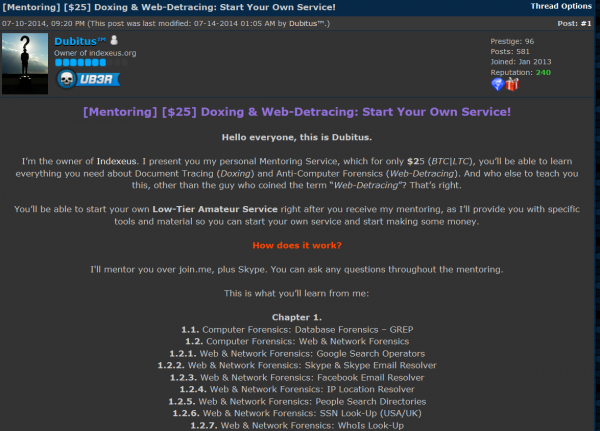Even Script Kids Have a Right to Be Forgotten
Indexeus, a new search engine that indexes user account information acquired from more than 100 recent data breaches, has caught many in the hacker underground off-guard. That’s because the breached databases crawled by this search engine are mostly sites frequented by young ne’er-do-wells who are just getting their feet wet in the cybercrime business.
Indexeus boasts that it has a searchable database of “over 200 million entries available to our customers.” The site allows anyone to query millions of records from some of the larger data breaches of late — including the recent break-ins at Adobe and Yahoo! – listing things like email addresses, usernames, passwords, Internet address, physical addresses, birthdays and other information that may be associated with those accounts.
Who are Indexeus’s target customers? Denizens of hackforums[dot]net, a huge forum that is overrun by novice teenage hackers (a.k.a “script kiddies”) from around the world who are selling and buying a broad variety of services designed to help attack, track or otherwise harass people online.
Few services are as full of irony and schadenfreude as Indexeus. You see, the majority of the 100+ databases crawled by this search engine are either from hacker forums that have been hacked, or from sites dedicated to offering so-called “booter” services — powerful servers that can be rented to launch denial-of-service attacks aimed at knocking Web sites and Web users offline.
The brains behind Indexeus — a gaggle of young men in their mid- to late teens or early 20s — envisioned the service as a way to frighten fellow hackers into paying to have their information removed or “blacklisted” from the search engine. Those who pay “donations” of approximately $1 per record (paid in Bitcoin) can not only get their records expunged, but that price also buys insurance against having their information indexed by the search engine in the event it shows up in future database leaks.
The team responsible for Indexeus explains the rationale for their project with the following dubious disclaimer:
“The purpose of Indexeus is not to provide private informations about someone, but to protect them by creating awareness. Therefore we are not responsible for any misuse or malicious use of our content and service. Indexeus is not a dump. A dump is by definition a file containing logins, passwords, personal details or emails. What Indexeus provides is a single-search, data-mining search engine.”
Such information would be very useful for those seeking to settle grudges by hijacking a rival hacker’s accounts. Unsurprisingly, a number of Hackforums users reported quickly finding many of their favorite usernames, passwords and other data on Indexeus. They began to protest against the service being marketed on Hackforums, charging that Indexeus was little more than a shakedown.
Indeed, the search engine was even indexing user accounts stolen from witza.net, the site operated by Hackforums administrator Jesse LaBrocca and used to process payments for Hackforums who wish to upgrade the standing of their accounts on the forum.
WHO RUNS INDEXEUS?
The individual who hired programmers to help him build Indexeus uses the nickname “Dubitus” on Hackforums and other forums. For the bargain price of $25 and two hours of your time on a Saturday, Dubitus also sells online instructional training on “doxing” people — working backwards from someone’s various online personas to determine their real-life name, address and other personal data.
Dubitus claims to be a master at something he calls “Web detracing,” which is basically removing all of the links from your online personas that might allow someone to dox you. I have no idea if his training class is any good, but it wasn’t terribly difficult to find this young man in the real world.
Contacted via Facebook by KrebsOnSecurity, Jason Relinquo, 23, from Lisbon, Portugal, acknowledged organizing and running the search engine. He also claims his service was built merely as an educational tool.
“I want this to grow and be a reference, and at some point by a tool useful enough to be used by law enforcement,” Relinquo said. “I wouldn’t have won the NATO Cyberdefense Competition if I didn’t have a bigger picture in my mind. Just keep that in yours.”
Relinquo said that to address criticisms that his service was a shakedown, he recently modified the terms of service so that users don’t have to pay to have their information removed from the site. Even so, it remains unclear how users would prove that they are the rightful owner of specific records indexed by the service.
“We’re going through some reforms (free blacklisting, plus subscription based searches), due some legal complications that I don’t want to escalate,” Relinquo wrote in a chat session. “If [Indexeus users] want to keep the logs and pay for the blacklist, it’s an option. We also state that in case of a minor, the removal is immediate.”
Asked which sort of legal complications were bedeviling his project, Relinquo cited the so-called “right to be forgotten,” data protection and privacy laws in Europe that were strengthened by a May 2014 decision by the European Court of Justice in a ruling against Google. In that case, the EU’s highest court ruled that individuals have a right to request the removal of Internet search results, including their names, that are “inadequate, irrelevant or no longer relevant, or excessive.”
I find it difficult to believe that Indexeus’s creators would be swayed by such technicalities, given that that the service was set up to sell passwords to members of a forum known to be frequented by people who will use them for malicious purposes. In any case, I doubt this is the last time we will hear of a service like this. Some 822 million records were exposed in more than 2,160 separate data breach incidents last year, and there is plenty of room for competition and further specialization in the hacked-data search engine market.
![Indexeus[dot]org](http://krebsonsecurity.com/wp-content/uploads/2014/07/indexeus-285x176.png)



You must be logged in to post a comment.